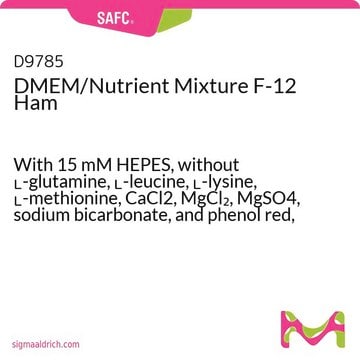D8062
DMEM/F-12
With ʟ-glutamine, sodium bicarbonate and sodium pyruvate, liquid, sterile-filtered, suitable for cell culture
Synonym(s):
DME/Nutrient Mixture F-12 Ham, DMEM Hams F12, DME/F-12, 1:1 mixture
About This Item
Recommended Products
product name
Dulbecco′s Modified Eagle′s Medium/Nutrient Mixture F-12 Ham, With L-glutamine and sodium bicarbonate, without HEPES, liquid, sterile-filtered, suitable for cell culture
sterility
sterile-filtered
form
liquid
technique(s)
cell culture | mammalian: suitable
impurities
endotoxin, tested
components
glucose: 3.15 g/L
NaHCO3: yes
L-glutamine: yes
phenol red: yes
HEPES: no
sodium pyruvate: 0.055 g/L
shipped in
ambient
storage temp.
2-8°C
Looking for similar products? Visit Product Comparison Guide
General description
Application
- to maintain human lung and colorectal cancer cell lines for the biological evaluation of the secondary metabolites
- to culture human kidney-2 (HK-2) cells and as a component of the assay medium for lysophosphatidylcholine (LPC) treatment
- to culture mouse squamous cell carcinoma (SCCVII) tumor cells
also commonly purchased with this product
supplement
Storage Class Code
12 - Non Combustible Liquids
WGK
WGK 2
Flash Point(F)
Not applicable
Flash Point(C)
Not applicable
Certificates of Analysis (COA)
Search for Certificates of Analysis (COA) by entering the products Lot/Batch Number. Lot and Batch Numbers can be found on a product’s label following the words ‘Lot’ or ‘Batch’.
Already Own This Product?
Find documentation for the products that you have recently purchased in the Document Library.
Customers Also Viewed
Articles
Nutrient Mixture F-12 Ham Formulation
Calcium is an ionically stable divalent cation with important beneficial and toxic properties in cell culture. It is a component of a wide range of cell culture media.
Our team of scientists has experience in all areas of research including Life Science, Material Science, Chemical Synthesis, Chromatography, Analytical and many others.
Contact Technical Service








